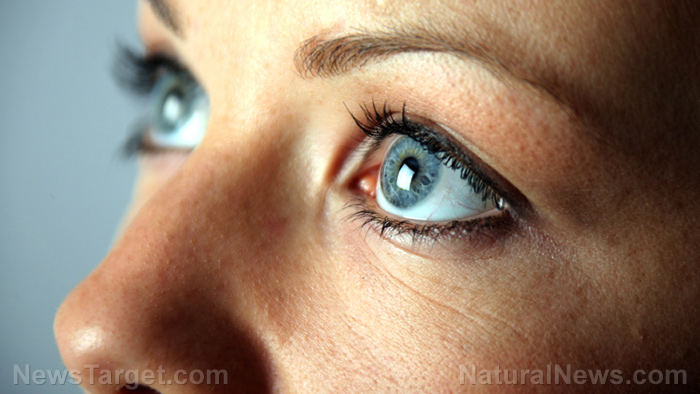Here are some natural interventions that slow down (and sometimes even reverse) cataracts
Friday, November 16, 2018 by: Zoey Sky
Tags: botanicals, cataracts, eye health, eyesight, goodfood, goodhealth, goodmedicine, healing foods, herbal medicine,herbal remedies, home remedies, natural cures, natural healing, natural medicine, natural remedies, prevention, proper nutrition, remedies, research
Tags: botanicals, cataracts, eye health, eyesight, goodfood, goodhealth, goodmedicine, healing foods, herbal medicine,herbal remedies, home remedies, natural cures, natural healing, natural medicine, natural remedies, prevention, proper nutrition, remedies, research
0VIEWS

(Natural News) Regardless of your actual age, your eyes are often the last thing that stays young. However, this is only possible if you regularly follow a healthy diet.
Preventing and reversing cataracts
While cataracts are linked to poorer eyesight and even blindness, they are believed to be an inevitable part of aging. However, certain modifiable risk factors and natural interventions may help slow and even reverse this condition.
- Curcumin (turmeric extract) – There is significant data that confirms the health benefits of curcumin in the animal model of cataract formation. Study data revealed that curcumin, a highly therapeutic polyphenol that’s responsible for turmeric’s bright yellow color, can help prevent the formation of cataracts.
- Don’t use cholesterol-lowering statin drugs – For more than 20 years, data from animal research has determined that statin drugs are linked to cataracts. In the post-marketing surveillance of statin drug users, findings have shown that when taken, “either alone or in combination with other drugs which inhibit their metabolism,” the drugs increase the risk of cataracts in individuals who take them. An identified mechanism for the cataractogenic potential of these drugs is the fact that they can gain systemic distribution in the body, which happens when they pass through the blood-brain-barrier and enter the eye itself, specifically, the outer cortical region of the lens where cholesterol synthesis is critical. This mechanism is responsible for the damage in the lens. (Related: 8 Eye issues you can’t afford to ignore.)
- Lutein – According to a two-year double-blind, placebo-controlled pilot study, lutein can help improve visual function in individuals with age-related cataracts. Sources of lutein include egg yolks, kale, and marigold.
- Wheatgrass – Data from a 2005 study, which was titled “Aging reversibility: from thymus graft to vegetable extract treatment — application to cure an age-associated pathology” and published in the journal Biogerontology, wheatgrass can potentially reverse lens opacity linked to cataracts. Researchers explained that for the study, the lens opacity of old dogs who received oral dosages of wheatgrass for one month was measured before and after the treatment. The results revealed that there was a 25 to 40 percent reduction of lens opacity. The study authors posited that the wheat sprouts can help in “the recovery of age-related alterations and in treating age-associated pathologies” because they contain “regulatory acid peptides, a remarkable level of highly energetic phosphoric radicals and antioxidant molecules. These compounds in wheatgrass can potentially help reduce lens opacity.
What are cataracts?
Cataracts are dense and cloudy areas that can form in the lens of your eye. A cataract often develops when proteins in your eye form clumps that prevent the lens from sending clear images to your retina.
100% organic essential oil sets now available for your home and personal care, including Rosemary, Oregano, Eucalyptus, Tea Tree, Clary Sage and more, all 100% organic and laboratory tested for safety. A multitude of uses, from stress reduction to topical first aid. See the complete listing here, and help support this news site.
The retina works by turning the light that comes through the lens into signals. The signals are then sent to the optic nerve, which is finally sent to the brain.
A cataract forms slowly and in time, it will interfere with your vision. You might get cataracts in both eyes, but they rarely form simultaneously.
Older people often develop cataracts. The National Eye Institute reports that more than 50 percent of individuals in the U.S. have cataracts or have undergone cataract surgery the moment they turn 80 years old.
Some common symptoms of cataracts include:
- Blurry vision
- Double vision in the affected eye
- Frequently needing changes in prescription glasses
- Halos surrounding lights
- Increased sensitivity to glare
- Trouble seeing at night
Some underlying causes of cataracts may include:
- Certain diseases (e.g., diabetes)
- The long-term use of steroids and other medications
- Radiation therapy
- Smoking
- Trauma
- Ultraviolet radiation
Don’t wait until your eyesight starts to worsen. Follow a healthy diet today to delay and maybe even reverse your cataracts.
Find more ways of taking care of your eyes naturally at Healing.news.
Sources include:

No comments:
Post a Comment